|
|
|
Sort Order |
|
|
|
Items / Page
|
|
|
|
|
|
|
| Srl | Item |
| 1 |
ID:
161669
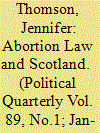

|
|
|
|
|
| Summary/Abstract |
In recent years, several decisions have been made regarding the devolution of abortion laws from central government at Westminster to the devolved regions of the United Kingdom. This article considers the decision to devolve abortion law to Scotland. It addresses Westminster debates from the time, employing a discursive analysis to examine the arguments made for this legislative move. It argues that the debate was largely a proxy argument for the broader question of Westminster–Edinburgh relations and Scottish independence. It further argues that utilising abortion in this way is problematic, and politicises an area which is better seen as an issue solely of women's rights.
|
|
|
|
|
|
|
|
|
|
|
|
|
|
|
|
| 2 |
ID:
161667


|
|
|
|
|
| Summary/Abstract |
This article argues that Ken Loach's film, I, Daniel Blake, invites deep reflection on the relationship between the individual and the state, and, more particularly, on the role of administrative justice in restoring a re‐imagined sense of citizenship. Drawing on earlier debates from the 1950s, as well as on more recent advocacy of the ‘connected society’, the article proposes that to meet such an ambition, administrative justice must be recognised as an overarching set of principles and values, rooted in a framework of human rights and with a reinvigorated public‐sector ombud‐institution at its centre. In this way, administrative justice might serve as an effective and restorative counterweight to more legalistic options for responding to public grievance, whether the result of routine encounters with the state or of a major breakdown in trust, such as that occasioned by ‘Grenfell Tower’.
|
|
|
|
|
|
|
|
|
|
|
|
|
|
|
|
| 3 |
ID:
161666
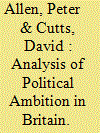

|
|
|
|
|
| Summary/Abstract |
Representative democracies require sufficient numbers of citizens to put themselves forward as candidates for political office. Existing studies have shown that political institutions are not representative of the population as a whole, suggesting that political ambition is not evenly distributed across all potential candidates. We discuss evidence from the first systematic study of political ambition in Britain, examining the question of who is interested in putting themselves forward for political office. We find patterns in the distribution of political ambition that help to explain why British political institutions do not look like the British people as a whole and include a gender gap, a social class gap, an education gap, a north–south divide, and a personality gap. We discuss the implications of our findings for political parties, arguing that they need to adjust practices of candidate recruitment in such a way that minimises the effects of these biases.
|
|
|
|
|
|
|
|
|
|
|
|
|
|
|
|
| 4 |
ID:
161657


|
|
|
|
|
| Summary/Abstract |
The Department of Government at Essex University provided a favourable environment for the development of Anthony King's work. While his primary interest was the UK, his intellectual interests were far broader in scope and informed by comparative insights. His key work was on political leadership, but he also made crucial contributions on other issues such as ungovernability. He had a particular concern with the quality of government, reflected in the Blunders book he wrote with Ivor Crewe.
|
|
|
|
|
|
|
|
|
|
|
|
|
|
|
|
| 5 |
ID:
161662


|
|
|
|
|
| Summary/Abstract |
Anthony King was a keen follower of American politics. His writings on the subject combined his respect for democratic practices with a strong concern for deliberation in governance. These concerns, familiar from his writings on the UK, caused him to worry that American politicians campaigned too much and governed too little.
|
|
|
|
|
|
|
|
|
|
|
|
|
|
|
|
| 6 |
ID:
161671


|
|
|
|
|
| Summary/Abstract |
There seems to be an emerging conventional wisdom that the Brexit vote resulted from specific domestic factors in Britain, such as divisions within the ruling Conservative party, the rise of UKIP, strong reaction to increased immigration, all set against the backdrop of globalisation and its adverse effects. The end result was a populist revolt. The argument presented here is somewhat different. Whilst accepting that the above factors were certainly very important, it is argued that it is important to examine the key role of the EU itself in the creation of the current crisis within the EU. The construction of an EU policy‐making state has run far ahead of what voters at the national level want, leading to a central paradox within the EU, namely that the European elite which runs the EU has introduced some very beneficial public policies, yet that elite has become increasingly out of touch with its peoples.
|
|
|
|
|
|
|
|
|
|
|
|
|
|
|
|
| 7 |
ID:
161661
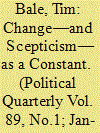

|
|
|
|
|
| Summary/Abstract |
Tony King had a healthy disrespect for conventional wisdom but a deep appreciation for common sense. Drawing on an eclectic mix of sources, both qualitative and quantitative, he wore his learning lightly, the better to highlight and explain to academic and non‐academic audiences how shifts in society and public opinion drove change inside parties and in the party systems in which they operated. King asked great questions and provided answers that simultaneously captured complexity and the big picture. His provocative interpretations and analysis were always stimulating—and many of them proved highly prescient.
|
|
|
|
|
|
|
|
|
|
|
|
|
|
|
|
| 8 |
ID:
161658
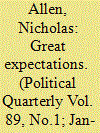

|
|
|
|
|
| Summary/Abstract |
Anthony King thought and wrote a great deal about British prime ministers and political leadership more generally. But in contrast to the way in which single papers embodied his contribution to our understanding of ‘government overload’, ‘executive‐legislative relations’ and ‘career politicians’, his contribution to our understanding of the prime ministership was defined by a body of work. This essay explores that body of work and identifies some of the themes that characterised it. It then relates King's work to claims about the ‘presidentialisation’ of the office, as well as the importance of the expectations surrounding contemporary prime ministers. As Britain grapples with the challenge of Brexit, we should all take note of his counsel against expecting too much in the way of ‘strong’ prime ministerial leadership.
|
|
|
|
|
|
|
|
|
|
|
|
|
|
|
|
| 9 |
ID:
161656
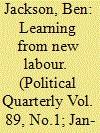

|
|
|
|
|
| Summary/Abstract |
The twentieth anniversary of Labour's 1997 election victory passed without much comment last year—among other reasons, the hectic pace of political developments left little space for historical debate. But two revealing reflections on New Labour's legacy did surface towards the end of 2017. James Graham's play about the recent history of the Labour party, Labour of Love, debuted in London in late September and Gordon Brown's memoir, My Life, Our Times, was published in November.
|
|
|
|
|
|
|
|
|
|
|
|
|
|
|
|
| 10 |
ID:
161670


|
|
|
|
|
| Summary/Abstract |
Scotland's media has traditionally provided one of the central aspects of Scottish distinctiveness, autonomy and identity. This has often historically been viewed unproblematically and uncritically, but in recent times, the selective discourses of the mainstream media have come under increasing scrutiny and challenge, particularly in the recent independence referendum.
This article examines the changing output of BBC and STV, considering in detail the evening news and current affairs programmes of both channels, and charting how they have evolved in media content and output. It also examines wider output and representation by BBC and STV, and concludes by addressing the evolving political and media environment.
|
|
|
|
|
|
|
|
|
|
|
|
|
|
|
|
| 11 |
ID:
161659
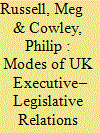

|
|
|
|
|
| Summary/Abstract |
Anthony King's 1976 article ‘Modes of executive–legislative relations: Great Britain, France and West Germany’ is a classic in legislative studies. It argued that it is simplistic to analyse relations between ‘the executive’ and ‘the legislature’ in parliamentary systems, because parliaments are complex organisations comprised of competing actors. Instead, we must consider the various ‘modes’ through which these actors can interact to challenge the executive. As King pointed out, the classic view of the British Parliament was of a dominant ‘opposition mode’ and yet, in fact, the most important relationship was the ‘intraparty mode’: between the government and its own backbenchers. Other options, such as the ‘non‐party mode’ or ‘cross‐party mode’ were considered weak in Britain. This article revisits King's modes in the light of changes at Westminster during the intervening forty years. Developments such as the establishment of the select committee system and a more confident and party‐balanced House of Lords require significant changes to his conclusions. But his central insights, encouraging readers to focus on the multiple relationships inside legislatures, including those within political parties, remain fundamentally important.
|
|
|
|
|
|
|
|
|
|
|
|
|
|
|
|
| 12 |
ID:
161672


|
|
|
|
|
| Summary/Abstract |
Both during and since the 2016 referendum on the UK's membership of the European Union, concerns were raised as to the absence of contingency planning within Whitehall. This situation was in direct contrast with 1975, when extensive planning took place for the possibility of a vote to leave the European Community. However, there has been little in the way of detailed analysis of the contingency planning undertaken in 1975. Using archival evidence of the Wilson government's preparations, this article highlights the complex challenge that withdrawal would have posed for the UK in 1975, the tensions that existed between the political imperative for a swift withdrawal, in the event of a leave vote, and the civil service's concerns as to whether such a withdrawal was deliverable. Finally, it shows how dependent the UK's position would have been on the approach taken by the other members of the EC.
|
|
|
|
|
|
|
|
|
|
|
|
|
|
|
|
| 13 |
ID:
161663


|
|
|
|
|
| Summary/Abstract |
Tony King combined scholarship with a real‐world grasp that few could match. This was evident both in his public activities and in his published work. His studies of legislatures and of career politicians changed the way in which issues were viewed and he was skilled at identifying emerging trends before anyone else. He analysed the failings of government, but always as a practical improver. He was a natural communicator in the Bagehot tradition, as evidenced in his writings on the constitution, and he wanted a less adversarial political culture. He showed political scientists that it was possible to combine good scholarship with an ability to communicate.
|
|
|
|
|
|
|
|
|
|
|
|
|
|
|
|
| 14 |
ID:
161664


|
|
|
|
|
| Summary/Abstract |
The UK's ongoing political turbulence has prompted a reprise of debates from the 1970s when many concluded the country was ungovernable. Then, the most influential diagnosis conceptualised the UK's governance problem as one of ‘overloading’ caused by the electorate's excessive expectations. This article argues that these accounts overlooked another phenomenon besieging UK governance during this period. This phenomenon was freeloading: the withering of government capacity deriving from the ability of actors to enjoy the benefits of citizenship without altogether contributing to the cost. In the interim, these problems have become endemic, not least because of the unspoken but discernible policy of successive governments to turn the UK into a tax haven. High‐profile scandals involving prominent individuals and corporations, plus the failure to clamp down on them have reinforced the perception that the UK's political system is geared towards the rich and the powerful at the expense of the marginalised majority.
|
|
|
|
|
|
|
|
|
|
|
|
|
|
|
|
| 15 |
ID:
161665
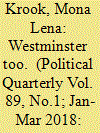

|
|
|
|
|
| Summary/Abstract |
At the end of 2017, millions of women used the #MeToo hashtag to draw attention to widespread sexual harassment and assault around the world. In British politics, female politicians, staff members, and journalists opened up about their own experiences, provoking the resignation and party suspension of a number of male Cabinet ministers and Members of Parliament. This article explores how this issue got on the political agenda, what features of politics might foster harassment and discourage reporting, and what solutions might be pursued to tackle this problem. It argues that sexual harassment should be understood as a systemic, cultural problem, rather than a question of problematic individuals. Ignoring the issue of sexual harassment in politics, the article concludes, has serious consequences for gender equality—as well as for democracy itself, reducing policy effectiveness, distorting the political pipeline, and diminishing political transparency and accountability.
|
|
|
|
|
|
|
|
|
|
|
|
|
|
|
|
| 16 |
ID:
161660


|
|
|
|
|
| Summary/Abstract |
Anthony King was, among other things, an outstandingly acute public intellectual. His work on overload and policy fiasco exemplifies this. His original diagnosis in his famous paper of 1975 was deeply pessimistic in character, but subsequent adaptations by government solved many of the original problems arising from dependency relations. These adaptations amounted to the creation of a Madisonian system of regulation that insulated policy makers from democratic pressures. But these adaptations in turn created new difficulties that lie at the root of the analysis in King and Crewe's The Blunders of our Governments, published nearly four decades after King's original classic paper.
|
|
|
|
|
|
|
|
|
|
|
|
|
|
|
|
| 17 |
ID:
161668


|
|
|
|
|
| Summary/Abstract |
How is it that the UK government continues to export weapons to Saudi Arabia for use in the war in Yemen, despite an explicit commitment to international humanitarian law (IHL)? And how is it that the High Court recently dismissed a case of judicial review, confirming that the government was ‘rationally entitled to conclude’ that arms exports pose no clear risk to IHL in Yemen? In what follows, I explain how a flexible interpretation of risk, reliance on secret information, and deference of the Court to the executive serve to facilitate rather than restrict arms exports. The judges’ decision provides a stamp of approval to an arms export policy that has directly contributed to the deaths of thousands of civilians in Yemen. Attention to the Saudi/Yemen case shows the political and legal manoeuvring that goes into managing the contradictions in government arms export policy.
|
|
|
|
|
|
|
|
|
|
|
|
|
|
|
|
|
|
|
|
|